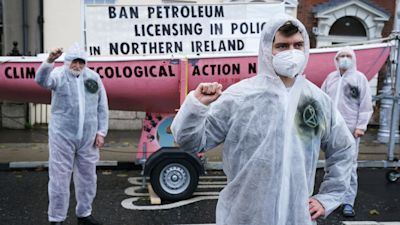Fracking ban unlikely this term and Fermanagh likely 'place of interest' Stormont committee hears

New legislation aimed at banning fracking in Northern Ireland looks unlikely to be passed in this Assembly term, a Stormont committee has heard.
Currently exploration for oil and gas can proceed under what are termed permitted development rights, with planning permission needed for commercial extraction.
Last year Infrastructure Minister Nichola Mallon announced her intention to tighten up the rules around fracking.
Meanwhile Sinn Fein MLA Aine Murphy brought a private member's Onshore Fracking (Prohibition) Bill.
She previously said that if passed, it will outlaw the exploration and extraction of petroleum by fracking.
But with just weeks before the Assembly is due to be dissolved for fresh elections, it remains at the committee stage of the legislative process.
The Stormont Economy Committee received a briefing from Rob Raine of Geological Survey Northern Ireland on Wednesday, as part of its consideration of the Bill.
He described hydraulic fracturing or fracking as a combination of two techniques, the drilling of long horizontal laterals extensions and hydraulic fracturing at high volumes, developed in the early 20th century but first used together commercially in the 1980s.
He indicated that sections of Fermanagh are the most likely places to be of interest for fracking.
"The geological history of Northern Ireland has led to several areas of thickly buried sediment which have been buried to a suitable depth to make them prospective for oil and gas," he told MLAs.
"Almost all of the prospective areas for shale are concentrated in what's called the North West Carboniferous Basin, this is largely located in Fermanagh."
Alliance MLA Stewart Dickson described the chemicals used in the fracking process as "lethal", and said fear of their entering the public water supply or agricultural land is of "severe concern for members of the public".
Committee chairwoman Caoimhe Archibald said the briefing had been useful although the Bill will not proceed in this mandate.
"Obviously it's something that a future committee will return to in the next mandate," she said.